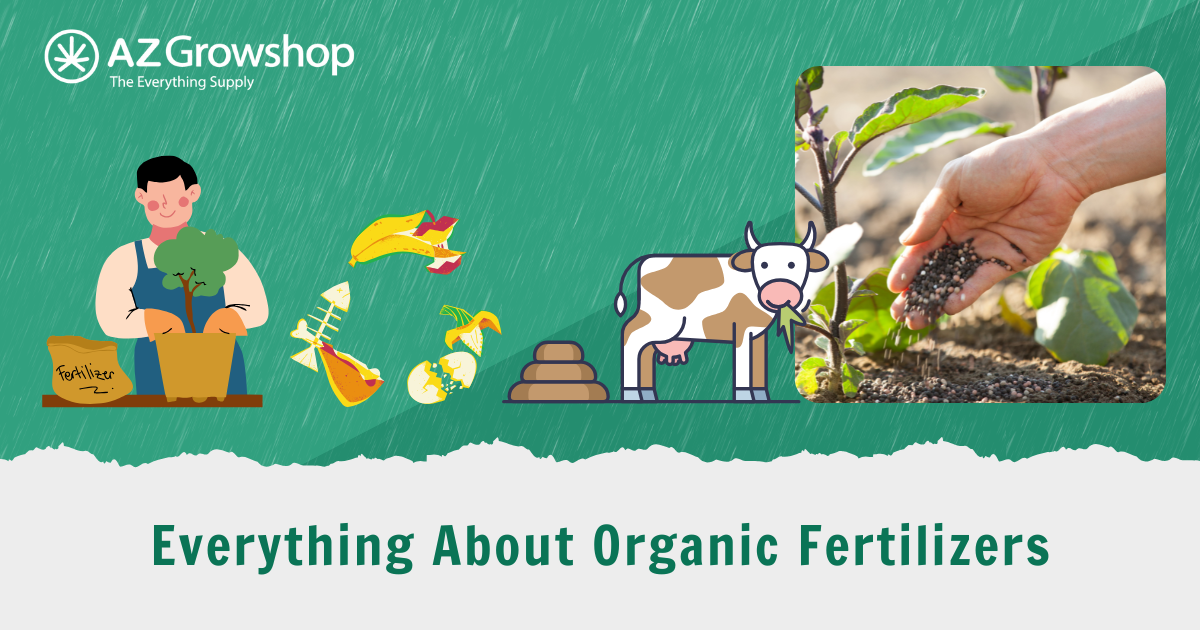Organic fertilizers are crucial for sustainable agriculture, offering a natural alternative to inorganic/synthetic fertilizers. Unlike conventional fertilizers, organic fertilizers are made from natural materials, such as plant and animal by-products, minerals, and decomposed organic matter. These natural fertilizers enrich the soil with essential nutrients, helping plants grow healthier while enhancing the soil’s long-term fertility.
As the demand for eco-friendly agricultural practices increases, organic fertilizers have become popular among gardeners, farmers, and even large-scale agricultural operations. They improve soil structure, support biodiversity, and reduce the risks associated with chemical runoff into water bodies. This aligns well with the goals of sustainable farming, which seeks to balance productivity with environmental health.
Whether you are a home gardener or a commercial farmer, understanding the benefits and types of organic fertilizers can help you make better decisions for your crops and contribute to a more sustainable future.
Types of Organic Fertilizers
There are several types of organic fertilizers, each offering unique benefits depending on the source material and application. Here are the main categories:

- Animal-Based Fertilizers
- Manure: A traditional fertilizer, manure is rich in nitrogen and other key nutrients. Commonly used types include cow, chicken, and horse manure. Manure boosts soil fertility and improves its moisture-holding capacity.
- Bone Meal: Made from ground animal bones, bone meal is high in phosphorus, essential for root and flower growth.
- Blood Meal: A powerful source of nitrogen, blood meal enhances leafy growth and is especially useful for plants in need of a nitrogen boost.
- Plant-Based Fertilizers
- Compost: Often called "black gold," compost is made from decomposed plant material and is an excellent all-purpose fertilizer. It improves soil structure, adds nutrients, and supports microbial life.
- Green Manure: Green manure involves planting certain crops, like clover or legumes, specifically to be tilled back into the soil, enhancing organic matter and nitrogen.
- Seaweed Fertilizer: Extracted from sea plants, seaweed fertilizer contains trace elements that improve soil health and boost plant growth.
- Mineral-Based Fertilizers
- Rock Phosphate: High in phosphorus, rock phosphate is ideal for promoting root growth and flowering. It is often used in soil with low phosphorus levels.
- Gypsum: Used to improve soil structure and add calcium, gypsum is especially beneficial in soils with high clay content.
- Biofertilizers
- Rhizobium: These nitrogen-fixing bacteria form symbiotic relationships with legumes, adding nitrogen directly to the soil.
- Mycorrhiza: Fungi that enhance root growth by forming beneficial relationships with plant roots, improving water and nutrient uptake.
Each type of organic fertilizer brings unique benefits to the soil and plants, making it easy to tailor your fertilizer choice to your specific gardening needs.
Benefits of Using Organic Fertilizers
Organic fertilizers offer a wide array of benefits that promote healthier plants, soil, and ecosystems:

- Enhanced Soil Structure and Fertility: Organic fertilizers improve the soil's texture and composition, allowing roots to grow deeper and absorb nutrients more effectively. Over time, this leads to healthier and more productive plants.
- Support for Soil Microorganisms: Organic fertilizers encourage the growth of beneficial soil microorganisms, which break down organic material and convert it into essential nutrients for plants. This natural cycle helps maintain a balanced and fertile soil environment.
- Reduced Environmental Impact: Since organic fertilizers are made from natural sources, they decompose without releasing harmful chemicals. This reduces pollution and minimizes risks to surrounding water sources, making organic fertilizers an eco-friendly choice.
- Slow Nutrient Release: Unlike synthetic fertilizers, organic fertilizers release nutrients slowly, providing a steady supply to plants without overwhelming them. This slow release reduces nutrient leaching, ensuring that plants get what they need over time.
Incorporating organic fertilizers into your gardening or farming routine not only improves plant health but also contributes to the sustainability of agricultural practices.
How Organic Fertilizers Work
Organic fertilizers operate differently than synthetic fertilizers by working in harmony with the soil ecosystem. They release nutrients slowly as they decompose, allowing plants to absorb nutrients gradually. This process prevents nutrient runoff and ensures the soil retains its fertility.

The nutrients in organic fertilizers are often bound within complex organic molecules that microorganisms break down over time. This process not only provides essential nutrients like nitrogen, phosphorus, and potassium but also encourages the growth of beneficial microbes. These microbes help break down organic matter further, enriching the soil’s texture and nutrient profile.
Additionally, organic fertilizers help plants build resilience. By supporting stronger root systems and healthier soil, plants grown with organic fertilizers are often more resistant to diseases and pests. Over time, organic fertilization practices lead to a balanced, nutrient-rich soil environment that sustains plant health naturally.
Comparing Organic and Inorganic Fertilizers
- Nutrient Content and Availability: Organic fertilizers release nutrients slowly, making them less likely to leach away. In contrast, inorganic fertilizers deliver immediate results but may require frequent applications.
- Environmental Effects: Organic fertilizers are biodegradable and free of synthetic chemicals, making them less harmful to the environment. Chemical fertilizers can lead to soil degradation and water contamination if overused.
- Cost and Application: Organic fertilizers often require less frequent applications and improve soil health over time, making them a cost-effective choice. While synthetic fertilizers may be cheaper upfront, they don’t contribute to long-term soil health, potentially increasing costs in the long run.
- Suitability for Various Practices: Organic fertilizers are ideal for sustainable and organic farming practices, while synthetic/inorganic fertilizers might be preferred in conventional farming due to their fast-acting nature.
Choosing between organic and inorganic fertilizers depends on your goals, but organic options offer long-lasting benefits for both plants and the environment.
Application Methods for Organic Fertilizers

- Soil Incorporation: This method involves mixing organic fertilizers directly into the soil before planting. Materials like compost and manure are typically incorporated during soil preparation. Soil incorporation allows nutrients to be readily accessible to plant roots and enhances soil structure.
- Top-Dressing: Organic fertilizers, such as bone meal and blood meal, can be applied to the soil surface around the root area as a top-dressing. This method is often used for established plants to give them an extra nutrient boost. Over time, nutrients will gradually seep down into the soil and become available to the roots.
- Foliar Feeding: Some organic fertilizers can be applied directly to plant leaves as a liquid spray. Foliar feeding delivers nutrients rapidly and is especially helpful for plants showing signs of nutrient deficiencies. Fish emulsion and seaweed extracts are popular organic foliar feeds.
- Compost Tea Application: Compost tea is a liquid made by steeping compost in water. It contains beneficial microorganisms that improve soil health and plant vitality. Compost tea can be sprayed on foliage or watered into the soil, providing both a nutrient boost and microbial support.
Choosing the right application method depends on the type of organic fertilizer, the crop’s needs, and the stage of plant growth.
Factors to Consider When Choosing Organic Fertilizers
- Soil Type and Condition: Different soil types respond uniquely to fertilizers. Sandy soils benefit from compost, which improves moisture retention, while clay soils may need gypsum or other amendments to improve structure.
- Specific Crop Nutrient Requirements: Each plant type has unique nutrient demands. For example, leafy greens require higher nitrogen levels, while flowering plants need more phosphorus. Matching fertilizer type to crop needs ensures optimal growth.
- Availability and Cost of Organic Materials: Organic fertilizers vary in cost, with some, like compost, being more accessible, while specialized biofertilizers may be pricier. Consider budget and availability when selecting organic fertilizers for larger scale.
- Certification Standards for Organic Farming: If farming under organic certification, verify that the fertilizers comply with relevant organic standards. Some products may contain additives or processing agents not allowed in certified organic farming.
Challenges and Limitations of Organic Fertilizers
While organic fertilizers offer numerous benefits, they also come with certain limitations and challenges:
- Nutrient Variability: Organic fertilizers are less predictable in nutrient composition than other fertilizers. Factors like source material and decomposition rate can affect nutrient levels, requiring regular testing to ensure optimal nutrient balance.
- Potential for Pathogens: Animal-based organic fertilizers, such as manure, may contains harmful pathogens if not properly composted. Applying untreated manure directly to food crops can pose health problems, so it’s essential to follow safe composting practices.
- Slower Nutrient Release: Organic fertilizers generally release nutrients slowly, which may not meet the immediate needs of fast-growing plants. While this slow release benefits long-term soil health, it may require more planning to match crop cycles.
- Storage and Handling Requirements: Organic fertilizers can have shorter shelf lives and may attract pests if not stored properly. Additionally, they are often bulkier, making transport and application more labor-intensive.
Understanding these challenges helps farmers and gardeners plan around the limitations of organic fertilizers, ensuring a balanced and effective approach to sustainable agriculture.
Frequently Asked Questions about Organic Fertilizers
Can organic fertilizers be used in all types of soils?
Yes, organic fertilizers can be used in all soil types but should be chosen based on specific soil needs. For example, sandy soils benefit from compost to retain moisture, while clay soils may require amendments like gypsum.
How often should organic fertilizers be applied?
Organic fertilizers generally need less frequent application due to their slow-release nature. A typical application schedule might range from once every few weeks to once a season, depending on the crop and fertilizer type.
Are organic fertilizers safe for all plants?
Organic fertilizers are safe for most plants, but it’s essential to use the right type and amount. Over-application can lead to nutrient imbalances.
Organic Fertilizer Products Offered by AZ Growshop
AZ Growshop offers a diverse range of premium organic fertilizers that cater to various plant needs and growth stages. Their product line includes two leading brands in organic agriculture: **Biobizz** and **Advanced Nutrients**. Each product is crafted to boost plant health, improve soil structure, and support sustainable farming practices.

Biobizz Organic Fertilizers
- Acti·Vera: This organic booster, derived from aloe vera, strengthens plant immunity and speeds up nutrient absorption, making plants more resilient and vibrant.
- Top·Max: Known for enhancing flowering, Top·Max promotes larger blooms and intensifies flavor, making it ideal for fruiting and flowering plants.
- Root·Juice: Designed to stimulate root development, Root·Juice creates a stronger foundation, supporting faster and healthier growth.
- Microbes: This product adds beneficial bacteria and fungi to the soil, enhancing nutrient availability and supporting plant health.
- Light·Mix: A balanced soil mix for all plant stages, Light·Mix provides a perfect base for healthy, vibrant growth.
- Calmag: Essential for plants needing calcium and magnesium, Calmag corrects nutrient deficiencies and strengthens cell walls, leading to robust growth.
- Bio·Up and Bio·Down: These products adjust soil pH naturally, providing plants with the ideal environment to absorb nutrients effectively.
- Bio·Heaven: Packed with amino acids, Bio·Heaven improves nutrient uptake, enhances growth, and boosts overall plant vitality.
- Bio·Grow: Perfect for the vegetative stage, Bio·Grow is rich in nitrogen, promoting lush, leafy growth.
- Bio·Bloom: Formulated for the flowering stage, Bio·Bloom encourages abundant and healthy blooms.
- Alg·A·Mic: This seaweed extract-based product improves plant vitality, helping plants recover from stress and supporting vibrant growth.
Advanced Nutrients Organic Fertilizers
- Iguana Juice Grow: A complete, balanced nutrient blend for the growth phase, Iguana Juice Grow supports healthy, robust plant development.
- Iguana Juice Bloom: Designed for the flowering stage, Iguana Juice Bloom delivers essential nutrients to maximize blooms, fruit size, and overall yield quality.
Why Choose AZ Growshop's Organic Fertilizers?
AZ Growshop’s organic fertilizers are chosen for their quality and effectiveness. These products provide essential nutrients in natural, environmentally friendly formulas. They support sustainable agriculture and help plants thrive through every growth stage..
At AZ Growshop, we’re proud to offer top-quality organic fertilizers, including trusted brands like Biobizz and Advanced Nutrients. Whether you’re looking to enhance root strength, boost flowering, or enrich soil nutrients, our products are designed to deliver exceptional results. Visit AZ Growshop today to explore our full range of organic fertilizers and take the first step towards a healthier, greener garden. Let us help you make your garden thrive—naturally!




